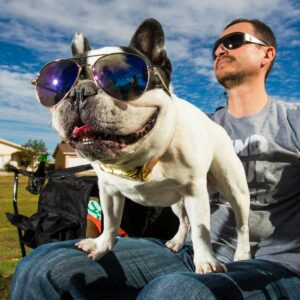Introduction
Your Dog is Getting Old, But It’s Not Time to Give Up Yet: Here’s How to Help Them Live Their Best Life.
As your dog ages, it’s natural to worry about their health and well-being. But don’t despair! There are plenty of things you can do to help your senior dog live a long and happy life.
In this blog post, we’ll share some tips on how to care for a senior dog. We’ll cover everything from diet and exercise to grooming and veterinary care. We’ll also offer some advice on how to help your dog cope with any age-related health problems.
So don’t give up on your senior dog just yet. With your help, they can continue to enjoy their golden years.
Diet
One of the most important things you can do for your senior dog is to feed them a healthy diet. As dogs age, their metabolism slows down, so they don’t need as many calories as they did when they were younger. You’ll also want to choose a food that is high in protein and low in fat.
There are a number of senior dog foods on the market, so be sure to talk to your veterinarian about which one is right for your dog. You may also want to consider feeding your dog homemade meals. This can be a great way to control the ingredients in their food and ensure that they are getting all the nutrients they need.
[gap]
[divider align=”center” width=”500px”]
[ux_text text_align=”center”]
CozyQ’s Favorite
[/ux_text]
[divider align=”center” width=”500px”]
[gap]
[row]
[col span=”4″ span__sm=”12″ align=”center”]
[ux_html]
[/col]
[col span=”4″ span__sm=”12″ align=”center”]
[ux_html]
[/col]
[col span=”4″ span__sm=”12″ align=”center”]
[ux_html]
[/col]
[/row]
[gap]
[ux_image id=”12553″]
[gap]
[gap]
Exercise
Regular exercise is important for dogs of all ages, but it is especially important for senior dogs. Exercise helps to keep their muscles strong and their joints healthy. It also helps to reduce the risk of obesity and other health problems.
However, it’s important to adjust the intensity and duration of your dog’s exercise routine as they age. You may need to shorten their walks or avoid playing fetch for as long. It’s also important to be mindful of the weather and terrain when exercising your senior dog.
Grooming
As dogs age, their skin and coat may become more delicate. This means that it’s important to groom them regularly to prevent mats, tangles, and skin problems.
You should brush your senior dog’s coat at least once a week. You may also need to trim their nails more often, as they may not be able to wear them down as easily as they used to.
[gap]
[gap]
[ux_image id=”12555″]
[gap]
[gap]
Veterinary care
It’s important to take your senior dog to the veterinarian for regular checkups. This is especially important if they have any age-related health problems.
Your veterinarian will be able to monitor your dog’s health and identify any potential problems early on. They can also provide you with advice on how to care for your senior dog at home.
Common health problems
As dogs age, they are more likely to develop certain health problems, such as:
- Arthritis
- Cognitive dysfunction syndrome
- Diabetes
- Heart disease
- Kidney disease
- Liver disease
- Osteoarthritis
- Thyroid problems
[gap]
[divider align=”center” width=”500px”]
CozyQ’s Best Dog Walking Tools
[divider align=”center” width=”500px”]
[row]
[col span=”4″ span__sm=”12″ align=”center”]
[ux_html]
[/col]
[col span=”4″ span__sm=”12″ align=”center”]
[ux_html]
[/col]
[col span=”4″ span__sm=”12″ align=”center”]
[ux_html]
[/col]
[/row]
[gap]
If you notice any changes in your dog’s behavior or health, be sure to take them to the veterinarian right away.
How to help your dog cope with age-related health problems
If your dog has been diagnosed with an age-related health problem, there are a number of things you can do to help them cope:
- Follow your veterinarian’s instructions. This may include giving your dog medication, changing their diet, or providing them with additional support, such as a ramp or harness.
- Make your home comfortable for your dog. This may include providing them with soft bedding, placing food and water bowls in easy-to-reach places, and removing any obstacles that they may trip over.
[ux_image id=”12556″]
[gap]
In conclusion
Caring for a senior dog can be challenging, but it is also very rewarding. With a little extra care and attention, you can help your dog live a long and happy life.
Here are some key takeaways from this blog post:
- Feed your senior dog a healthy diet that is high in protein and low in fat.
- Provide your senior dog with regular exercise, but be mindful of their age and limitations.
- Groom your senior dog regularly to prevent mats, tangles, and skin problems.
- Take your senior dog to the veterinarian for regular checkups and to monitor for any age-related health problems.
- Help your senior dog cope with age-related health problems by following your veterinarian’s instructions, making your home comfortable for them, and spending time with them.
If you have a senior dog, be sure to cherish the time you have together. They are truly special creatures, and they deserve all the love and care we can give them.







